Improving sleep quality: a comprehensive guide for care workers
‘Twas the night before Christmas, when all through the house not a creature was stirring…except you…at 3am. Sound familiar?
 In the demanding world of social care, getting a restful night’s sleep is imperative to maintaining the energy and focus needed for the job. Yet, many care workers often find themselves struggling with sleep issues, leading to exhaustion and decreased performance. Understanding how to get a better night’s sleep can transform your workday, enhancing both your well-being and professional effectiveness. This guide will delve into practical tips for falling asleep, as well as waking up at night solutions, tailored specifically for those in the care sector. Explore sleep hygiene tips and strategies aimed at improving sleep quality, ensuring you’re rejuvenated and ready to face each day with renewed vigor.
In the demanding world of social care, getting a restful night’s sleep is imperative to maintaining the energy and focus needed for the job. Yet, many care workers often find themselves struggling with sleep issues, leading to exhaustion and decreased performance. Understanding how to get a better night’s sleep can transform your workday, enhancing both your well-being and professional effectiveness. This guide will delve into practical tips for falling asleep, as well as waking up at night solutions, tailored specifically for those in the care sector. Explore sleep hygiene tips and strategies aimed at improving sleep quality, ensuring you’re rejuvenated and ready to face each day with renewed vigor.
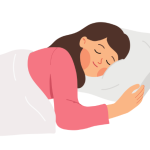
Understanding Sleep Challenges
Impact on Care Workers
For care workers, the effects of insufficient sleep can be particularly profound. The demanding nature of their job requires constant attention, empathy, and energy. Without adequate rest, these professionals may experience decreased cognitive function, leading to reduced attentiveness and increased risk of errors in patient care. This not only affects their well-being but can also compromise the quality of care provided to clients.
Chronic sleep deprivation can lead to heightened stress levels, impaired decision-making, and even burnout. Care workers often face irregular schedules, making it even more challenging to maintain a consistent sleep pattern. Understanding these impacts is the first step in addressing the issue. By prioritising sleep hygiene and adopting practical tips for falling asleep, care workers can significantly improve their sleep quality, ensuring they are better equipped to handle the physical and emotional demands of their roles.
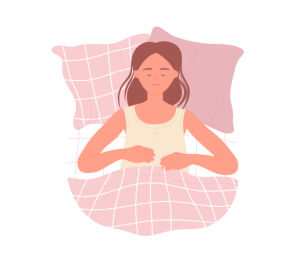
Identifying Common Issues
Care workers often face unique sleep challenges due to the nature of their work. Shift work is a significant contributor, as irregular hours can disrupt the body’s natural circadian rhythm.
Many care workers also experience stress and anxiety due to the emotional demands of their roles, which can lead to difficulties in falling asleep or staying asleep. Additionally, physical demands can result in discomfort or pain that interrupts rest.
Environmental factors, such as noise in residential care facilities or insufficient rest areas, further compound these issues. Understanding and identifying these common problems is essential to finding effective solutions. By recognizing patterns and triggers that affect sleep, care workers can adopt specific waking up at night solutions and sleep hygiene tips to combat these challenges. This proactive approach not only helps in improving sleep quality but also enhances overall job performance and personal well-being.
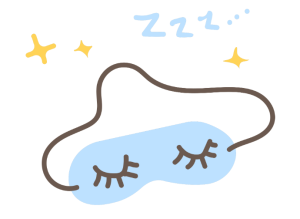
How to Get a Better Night’s Sleep
Sleep Hygiene Tips
Improving sleep quality starts with adopting effective sleep hygiene practices. For care workers, establishing a regular sleep schedule is crucial, even on days off, to help regulate the body’s internal clock.
Creating a calming pre-sleep routine can also be beneficial; this might include activities like reading, taking a warm bath, or doing light stretching.
It’s important to make the sleep environment as comfortable as possible, which means a dark, quiet, and cool room. Some schools of thought recommend that a hot shower is taken before bed so that you cool down ready for bed.
Limiting exposure to screens before bedtime can reduce disruptions to sleep patterns caused by blue light.
Additionally, avoiding caffeine and heavy meals in the hours leading up to sleep can prevent disturbances. Incorporating relaxation techniques, such as deep breathing or meditation, can help ease the transition to sleep. By integrating these sleep hygiene tips into daily routines, care workers can significantly enhance their ability to get a better night’s sleep, leading to improved health and job performance.
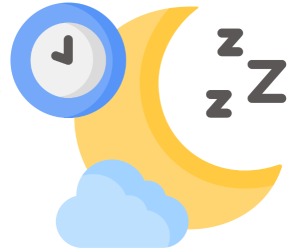
Tips for Falling Asleep
For care workers struggling to fall asleep, implementing targeted strategies can make a significant difference. Begin by ensuring your sleep environment is conducive to relaxation—keep the room dark and quiet, and invest in comfortable bedding.
Pre-sleep routine
Engaging in a consistent pre-sleep routine can signal your body that it’s time to wind down. This routine might include gentle games, listening to soothing music or practicing deep breathing exercises.
How caffeine impacts sleep
A potentially radical solution is to remove caffeine from your diet altogether. Studies show that this can reduce the likelihood of you wanting to get up in the night to go to the loo, plus it can reduce the instances of urinary tract infections – a bonus.
If this is a step too far, limiting caffeine and nicotine intake in the afternoon and evening can also promote easier sleep. Typically avoiding cups of tea or coffee after 2pm in the afternoon (it takes around 10 hours for caffeine to work through your system) will mean that you are more likely to get off to sleep easily.
Reduce stimulating activities
Try to avoid stimulating activities, such as watching TV or using electronic devices, at least 30 minutes before bedtime. Instead, focus on calming activities that reduce stress and anxiety. This could be a simple board game, reading or listening to a book, chatting with your family or listening to music. If you find yourself unable to fall asleep after 20 minutes, get up and do a quiet activity until you feel sleepy again.
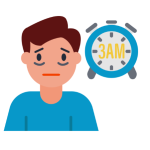
Waking Up at Night Solutions
Relaxation Techniques
Relaxation techniques can be highly effective in helping care workers return to sleep after waking up at night. One useful method is progressive muscle relaxation, which involves tensing and then slowly relaxing each muscle group, starting from the toes and moving upward. This practice helps alleviate physical tension and fosters a sense of calm.
Mindful breathing exercises are another strategy, focusing on slow, deep breaths to reduce anxiety and promote relaxation. Visualization techniques, where you picture a peaceful scene in detail, can also distract the mind from stress and help ease you back to sleep.
The importance of a relaxing environment
It’s important to maintain a tranquil environment; keeping the lights dim and avoiding screens can prevent further sleep disruption. Consistently practicing these relaxation techniques can enhance your ability to swiftly return to restful sleep, ensuring that care workers maintain the energy and focus required for their demanding roles.
Stop clock watching
Another tip is to avoid checking the time if you wake up in the middle of the night. Seeing that you have woken up again at 3am can lead to worry that you wont get back to sleep again and this anxiety makes it less likely that you will get off to sleep quickly.
Avoid facebook and other social media in the middle of the night
And whatever you do, don’t head to facebook on your phone to update everyone that you are part of the ‘wide awake club’. Seeing that enticing screen will ensure you dont get back to sleep again.
Adjusting Your Environment
Creating an optimal sleep environment is crucial for care workers who frequently wake up at night. Start by evaluating your bedroom setup. Ensure your mattress and pillows are comfortable and supportive, as discomfort can lead to frequent awakenings. Control the room temperature to be slightly cool, as this is generally more conducive to sleep. Minimize noise distractions by using earplugs or a white noise machine, which can help mask disruptive sounds. Consider using blackout curtains or an eye mask to block out any unwanted light. Organize the room to eliminate clutter, fostering a sense of calm and relaxation. If waking up at night is a regular issue, keeping a dim light handy can prevent major disruptions when navigating the room. Adjusting your environment to support uninterrupted sleep can significantly enhance your ability to fall back asleep quickly, ensuring you wake up refreshed and ready for the demands of your day.
Sleep aids
There are lots of sleep aids on the market, which can provide a temporary solution to getting a full nights’ sleep. However, there has also been a rise in the popularity of magnesium products such as sprays or topical butters and reviews suggest that applied before bedtime to feet and or legs, they can reduce the likelihood of you having an interrupted nights sleep.
Hopefully one or two of these ideas will work for you. We wish you the most wonderful nights sleep to you all during this festive season.
 Advice Hub
Advice Hub Find a home
Find a home Enquire now
Enquire now